To be clear, I'm not talking about the type of terrorism that swept over Americans after 9/11; I'm talking about a type of terrorism that is more associated with bullying. In
Persepolis, Marjane Satrapi details the horrific events of "Black Friday" followed by massacre after massacre. As hard as the image is to swallow, that's just how war is, plain and simple.

April 9, 1942 marked the beginning of the Bataan Death March. Bataan, coincidentally, is my family is from so, naturally, my relatives had fought to defend their home during the Japanese invasion. Following the surrender by the American and Filipino troops, Lieutenant General Masaharu Homma of the Japanese Imperial Army ordered the evacuation of all POWs to Camp O'Donnell, but even he could not have predicted what his soldiers would do. Over the course of the next month or so, American and Filipinos alike were abused, murdered, and tortured just like the Iranian revolutionaries in
Persepolis. They endured random shootings, strikes by rifles and bayonets, little to no food or water, and "the sun treatment" where prisoners were forced to sit out in the hot sun with no shade for hours at a time. Luckily, my great-grandfather who had been a schoolteacher that fought in the war was able to escape by women and children who would walk up next to the march and pull away friends or relatives to hide the prisoners until the Japanese Army was gone.

I'm not saying one event was worse than the other because they're not; they're both highly atrocious events in history. Abuse still takes place in different parts of the world today such as Somalia, Mexico, and Syria. The world needs to change and we need to be the people to change it. Our generation is the next to take the reigns from our parents and as Jon Stewart said, in his commencement speech to the graduating class of 2004 at The College of William and Mary, " We broke it... I know we were supposed to bequeath to the next generation a world better than the one we were handed. So sorry."

I realize that my Avatar is a cartoon, ironically from a show called Avatar: The Last Airbender, and it may be silly to compare the Death March with the plot of the show, but they're eerily similar.
Do you know what I'm talking about?
"Well considering my dad is an imperialistic, genocidal ass I'm going to say yes I do."
How so?
"Well, he massacred a whole race of people just so that nobody could get in his way. Basically, in this situation, my family would be the Japanese."
...
"Yeah, I realize that would make me look like a bad person, and I have done unspeakable things in the past, but there's no reason that I can't start doing good. I can't change what happened in the past, but I can make sure that it nothing similar ever happens again."













